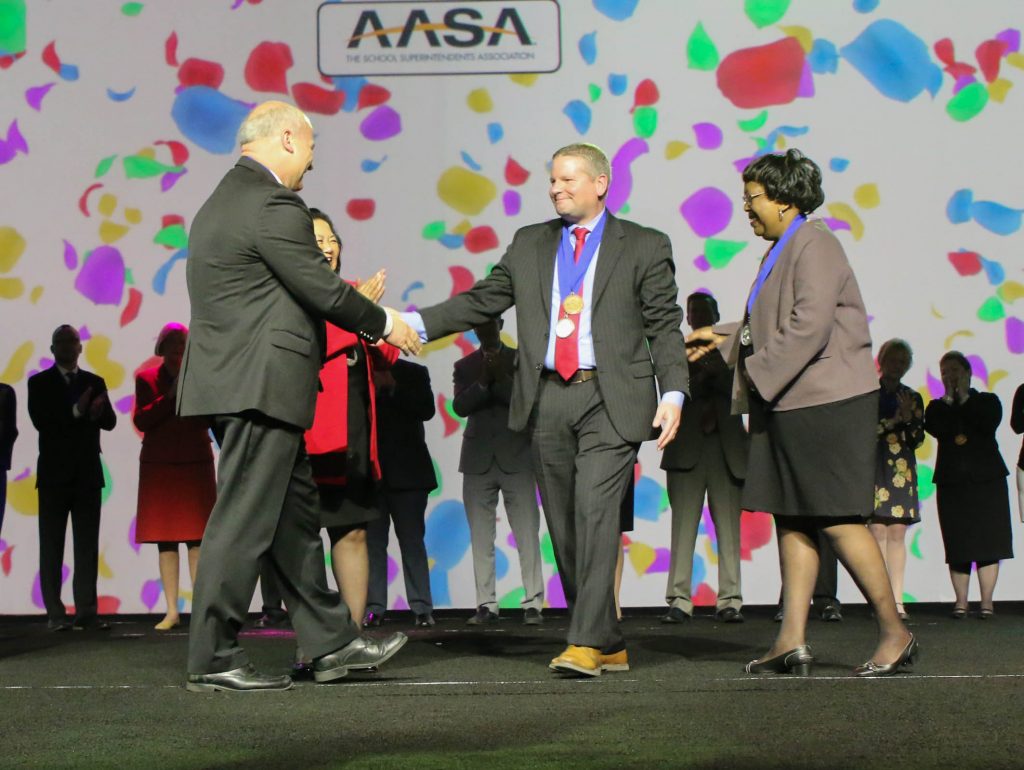A few years ago, David Schuler was giving a presentation to a group of administrators and asked, “How many of you started the year with a full teaching staff?” Only half raised their hands.
The moment stayed with him. “We have a huge teacher shortage in this country,” he says, “and we have fewer individuals entering education prep programs from underrepresented backgrounds.”
As he tends to do when he sees a challenge, Schuler, superintendent of High School District 214 in Arlington Heights, Ill., a Chicago suburb, and the newly crowned 2018 National Superintendent of the Year®, went to work on a solution. Today, his 12,000-student district features a thriving Educator Prep program, complete with a celebrative “signing day” for future teachers similar to that provided to prized athletes.
The program provides students with college credits and field experiences that give them a head start toward a teaching degree. Those who complete the program through college are guaranteed job interviews at District 214 or one of 36 partner districts. Schuler is hoping that half the teachers his district hires after the first class graduates from college will be from the program.
Already, other districts are following suit, and that’s how Schuler wants it. He makes no secret about wanting to have a national impact, and he sees his well-funded district as an incubator for new approaches.
“I was taught at a very early age to do what you can to change the world, and that’s what I’m trying to do, and that drives me every day,” he says.
Redefining Readiness
Schuler hasn’t wasted any time. By 2nd grade in his hometown of Clintonville, Wis., he had pretty much set his sights on following his mother’s footsteps into teaching. He was hired into his first superintendency at 29. He served as president of AASA, the School Superintendents Association, in 2015-16. Now, at 47, he is again in the national spotlight.
Brent Clark, executive director of the Illinois Association of School Administrators, says Schuler, who is in his 13th year at District 214, has calmly stepped to the fore in key debates in his state’s “volcanic” education environment. During the battle over the state’s school funding formula, he says, Schuler took a lead role even though his own district would not directly benefit from the reforms.
“That’s pretty big leadership,” Clark says.
Schuler is still pursuing an effort he spearheaded as AASA president. “Redefining Ready!” grew out of concerns that measurements tied to college and career ready were based almost entirely on students’ achievement test scores.
“It’s not right and it’s not fair, and it’s not accurately representing what the research suggests it means for a kid to be college and career ready,” he says.
Redefining Ready! broadens the scope of college readiness to include indicators like earning a 2.8 GPA or scoring a C or better in AP classes, dual credit courses or Algebra II. It gauges career readiness on whether students have identified a career interest and met benchmarks such as 90 percent attendance, community service or workplace learning experiences. Schuler has visited 38 states to discuss the initiative.
Amy Sichel, superintendent of the Abington School District north of Philadelphia and a past president of AASA, says Schuler is “incredibly passionate” about spreading the word on Redefining Ready! and other projects.
“Dave is just one of those guys who is in the forefront of education and knows the issues that are going to transform teaching and change what we do for America’s children,” she says.
Free to Innovate
One way that Schuler’s school district is getting students ready is by offering college credit courses early and often. He believes District 214 may be the only district in the country where all of this year’s sophomores will graduate with some college credit. To boost career readiness, the district is providing more than 3,000 external workplace learning experiences this year.
“If our goal is to change the trajectory of our children and their families’ dreams, we have to give them experiences outside of what they know in their current context,” he says.
Schuler also has turned the district’s adult education program into one of the most comprehensive in the country. The district serves 50,000 adult learners each year, with hundreds of courses ranging from math to yoga to family literacy.
He gives credit for his freedom to innovate to his school board, which he says allows him to “fail forward.” He extends that same opportunity to his staff and teachers.
“Not everything should work,” he says. “If everything is working we’re not pushing the envelope hard enough.”
(Paul Riede is a freelance education writer in Syracuse, N.Y.)


